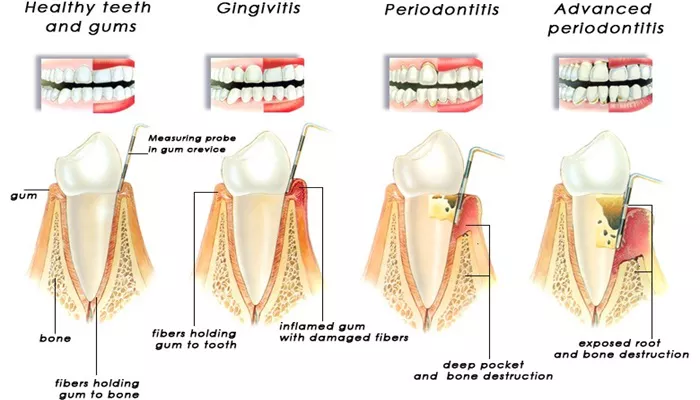Periodontal disease, also known as gum disease, is a common oral health condition that can lead to severe dental issues if left untreated.
This condition affects the tissues surrounding and supporting the teeth, including the gums, periodontal ligaments, and bone.
Understanding the causes of periodontal disease is crucial for effective prevention and management. In this article, we will delve into the three main causes of periodontal disease, providing insights into how they contribute to this condition and what you can do to protect your oral health.
1. Poor Oral Hygiene
The Foundation of Periodontal Health
The most prevalent cause of periodontal disease is poor oral hygiene.
Our mouths are home to a myriad of bacteria that form a sticky film known as plaque. If plaque is not regularly removed through proper brushing and flossing, it can harden into tartar. Tartar is a rough substance that firmly adheres to the teeth and can only be removed by a professional dental cleaning.
When plaque and tartar build up along the gum line, they create an environment conducive to the growth of harmful bacteria. These bacteria produce toxins that irritate and inflame the gum tissues, leading to gingivitis—the earliest stage of periodontal disease.
Gingivitis is characterized by red, swollen gums that bleed easily when brushed. If gingivitis is not addressed, it can progress to periodontitis, a more severe form of periodontal disease that can cause gum recession, loss of tooth-supporting bone, and eventually tooth loss.
SEE ALSO: How Does Tobacco Cause Periodontal Disease?
Preventive Measures:
Brush Your Teeth Twice Daily: Use fluoride toothpaste and a soft-bristled toothbrush to clean your teeth effectively.
Ensure you brush all surfaces, including the gum line.
Floss Daily: Flossing removes plaque and food particles between teeth and under the gum line that a toothbrush cannot reach.
Regular Dental Check-Ups: Visit your dentist regularly for professional cleanings and examinations. Your dentist can remove tartar and check for signs of gum disease.
2. Smoking And Tobacco Use
The Detrimental Effects of Smoking
Smoking and other forms of tobacco use are significant risk factors for periodontal disease. Tobacco products contain harmful chemicals that can impair the immune system’s ability to combat bacterial infections in the mouth. This weakened immune response makes it more challenging for the body to fight off the bacteria that cause periodontal disease.
In addition to impairing immune function, tobacco use reduces blood flow to the gums, which affects the healing process and exacerbates gum tissue damage. Smokers are more likely to experience severe periodontal disease and may have a reduced response to periodontal treatments compared to non-smokers.
Preventive Measures:
Quit Smoking: The most effective way to reduce your risk of periodontal disease related to tobacco use is to quit smoking.
Seek support from healthcare professionals or smoking cessation programs if needed.
Avoid Tobacco Products: Refrain from using any form of tobacco to protect your oral and overall health.
3. Systemic Health Conditions
The Impact of Overall Health on Gum Health
Certain systemic health conditions can contribute to the development and progression of periodontal disease. These conditions include:
Diabetes: Individuals with diabetes are at a higher risk for periodontal disease due to the effects of elevated blood sugar levels on gum health. High blood sugar can impair the body’s ability to heal and increase the risk of infections, including gum infections.
Hormonal Changes: Hormonal changes, such as those occurring during pregnancy, menstruation, or menopause, can affect the gums and increase susceptibility to periodontal disease. Hormonal fluctuations can make gums more sensitive and prone to inflammation.
Autoimmune Disorders: Conditions like rheumatoid arthritis and lupus can affect the body’s immune response and increase the risk of periodontal disease. Autoimmune disorders can lead to chronic inflammation in the body, including the gums.
Preventive Measures:
Manage Chronic Conditions: Work with your healthcare provider to manage chronic health conditions effectively.
Controlling blood sugar levels in diabetes and addressing hormonal imbalances can help mitigate the risk of periodontal disease.
Monitor Your Health: Regular medical check-ups and communication with your healthcare team can help detect and manage conditions that may impact your oral health.
Conclusion
Understanding the primary causes of periodontal disease—poor oral hygiene, smoking and tobacco use, and systemic health conditions—empowers you to take proactive steps to maintain optimal gum health. By adopting good oral hygiene practices, quitting tobacco use, and managing systemic health conditions, you can significantly reduce your risk of developing periodontal disease and preserve your smile for years to come. Regular dental visits are crucial for early detectionand treatment, ensuring that your gums remain healthy and your teeth stay firmly in place.

